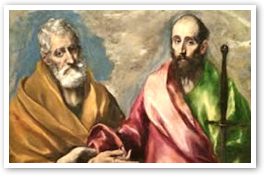Saint Peter and Saint Paul
- FATHER GEORGE W. RUTLER
There are personal memories, such as those kept in diaries and scrapbooks, and sometimes kept only in the heart; and there are collective memories recorded on cenotaphs and invoked on memorial days and shared at family reunions.
 |
Cicero said that to be ignorant of the past is to remain always a child. That is not the childlikeness that walks the way to heaven; it is the childishness that sees no way at all. Moses said, "And you shall remember the whole way that the Lord your God has led you these forty years in the wilderness . . ." (Deuteronomy 8:2). And before that he said, "Then take care lest you forget the Lord, who brought you out of the land of Egypt, out of the house of slavery" (Deuteronomy 6:12).
On the feast of Saints Peter and Paul, the Church remembers how their deaths planted the Faith in Rome. It is rare for a saint's feast to replace the ordinary propers of the Mass on Sunday. On a wall of the North American College in Rome is inscribed, "O Roma felix, quae duorum Principum es consecrata glorioso sanguine! (O happy Rome, which was consecrated by the glorious blood of the two Princes!)"
St. Peter urges us to "remember the words spoken in the past by the holy prophets, and the commandment of the Lord and Savior spoken through your apostles" (2 Peter 3:2). St. Paul encouraged the Christians in unruly Corinth: "Now I commend you because you remember me in everything and maintain the traditions even as I delivered them to you" (1 Corinthians 11:2). Both of these men were very different, and did not enjoy compatible temperaments (saints are not inevitably easy to get along with), but they were bound by a holy memory that had changed their lives.
Christianity is what it is because it is much more than that kind of human remembering which when strong is fidelity and when weak is nostalgia. At the center of Christian living is a kind of hyper-remembering, the Eucharistic anamnesis, in both the Roman Canon and the Divine Liturgy of the Easter Church. This is not simply the antidote to amnesia: it is an active participation in what is being remembered. It is the difference between recalling and calling, between representing and presenting. Thus the Eucharist is the Real Presence of Christ: his Body and Blood and Soul and Divinity.
St. Peter had a vivid memory of the Perfect Victim's crucifixion, which is why he asked to be crucified upside down, as he felt unworthy to imitate what he remembered seeing on Calvary. And St. Paul could remember every word the Master spoke to him on the Damascus road. They had no need of diaries or scrapbooks, because the Master was with them at the Holy Table, fulfilling his unfailing promise: "I am with you always, even unto the end of the world" (Matthew 28:20).
 This is Meaghen Gonzalez, Editor of CERC. I hope you appreciated this piece. We curate these articles especially for believers like you.
This is Meaghen Gonzalez, Editor of CERC. I hope you appreciated this piece. We curate these articles especially for believers like you.
Please show your appreciation by making a $3 donation. CERC is entirely reader supported.

Acknowledgement
Father George W. Rutler. "Saint Peter and Saint Paul." From the Pastor (June 29, 2014).
Reprinted with permission of Father George W. Rutler.
The Author
 Father George W. Rutler is the pastor of St. Michael's church in New York City. He has written many books, including: The Wit and Wisdom of Father George Rutler, The Stories of Hymns, Hints of Heaven: The Parables of Christ and What They Mean for You, Principalities and Powers: Spiritual Combat 1942-1943, Cloud of Witnesses — Dead People I Knew When They Were Alive, Coincidentally: Unserious Reflections on Trivial Connections, A Crisis of Saints: Essays on People and Principles, Brightest and Best, and Adam Danced: The Cross and the Seven Deadly Sins.
Father George W. Rutler is the pastor of St. Michael's church in New York City. He has written many books, including: The Wit and Wisdom of Father George Rutler, The Stories of Hymns, Hints of Heaven: The Parables of Christ and What They Mean for You, Principalities and Powers: Spiritual Combat 1942-1943, Cloud of Witnesses — Dead People I Knew When They Were Alive, Coincidentally: Unserious Reflections on Trivial Connections, A Crisis of Saints: Essays on People and Principles, Brightest and Best, and Adam Danced: The Cross and the Seven Deadly Sins.




